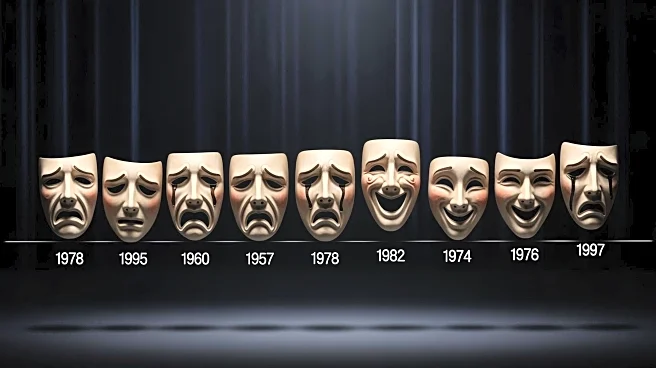What's Happening?
The Goodman Theatre, a prominent cultural institution in Chicago, has released a timeline detailing its significant milestones over the past century. Founded in 1925, the theater has been a pivotal force in the city's arts scene, transitioning from a drama
school to a professional company in 1969. Key events include the premiere of David Mamet's 'American Buffalo' in 1975, the theater's move to its current location in 2000, and the leadership of influential figures like Robert Falls. The timeline also highlights the theater's role in premiering works by renowned playwrights such as August Wilson and Arthur Miller, cementing its status as a leader in American theater.
Why It's Important?
The timeline underscores the Goodman Theatre's impact on the cultural landscape of Chicago and the broader theater community. By chronicling its history, the theater provides insight into the evolution of regional theater and its role in promoting diverse narratives and artistic innovation. The Goodman Theatre's contributions have helped shape Chicago's identity as a major cultural hub, attracting talent and audiences from across the country. This historical perspective highlights the importance of preserving and celebrating the arts as a means of fostering community and cultural enrichment.
What's Next?
As the Goodman Theatre looks to the future, it plans to continue its tradition of artistic excellence and community engagement. Upcoming projects include innovative productions that challenge traditional theatrical boundaries, such as an interactive experience inspired by neuroscience. Under the leadership of Susan Booth, the theater aims to expand its reach and influence, exploring new narratives and engaging diverse audiences. The Goodman Theatre's commitment to innovation and accessibility positions it as a leader in the next era of American theater.
Beyond the Headlines
The Goodman Theatre's timeline offers a deeper understanding of the cultural and economic forces that have shaped its journey. It reflects broader trends in the arts, such as the rise of regional theater and the importance of cultural institutions in urban development. The theater's ability to adapt to changing landscapes serves as a model for other institutions facing similar challenges. As the Goodman Theatre continues to evolve, it remains a vital part of Chicago's identity, embodying the city's spirit of innovation and resilience.















